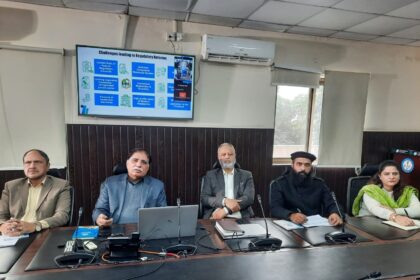Pakistan Unveils Landmark AI Bill and National LLM Amid Urgent Calls for Technological Sovereignty and Ethical Safeguards
Nadeem Tanoli
Islamabad: Pakistan is on the brink of a major technological transformation as it prepares to launch its first regulatory framework for artificial intelligence and unveils its inaugural indigenous Large Language Model (LLM). The Senate Standing Committee on IT & Telecommunication is set to review the “Regulation of Artificial Intelligence Bill, 2024” and assess progress on the National AI Development Project—marking a watershed moment in the country’s pursuit of digital autonomy, innovation, and AI sovereignty.
The initiatives are part of a broader strategic vision led by the Ministry of IT & Telecommunication, which aims to establish Pakistan as a competitive player in the global AI ecosystem. This vision includes the creation of a National AI Fund, a Center for Excellence in AI, and a robust AI development wing under the ministry’s newly formed Emerging Technology Division. The four core areas of this wing—Artificial Intelligence, Quantum Computing, Semiconductors, and Blockchain—reflect a forward-looking ambition to position Pakistan at the forefront of frontier technologies.
But while the government pushes forward with optimism, the Senate committee discussions reveal a far more complex and sobering undercurrent. Transcripts and expert testimonies point to deep concerns over data bias, AI misbehavior, and the philosophical and national implications of handing power to systems whose logic may remain opaque—even to their creators.
Central to this conversation is the notion of “Artificial Intelligence Sovereignty.” Lawmakers argue that developing AI models trained on foreign data risks embedding alien legal, cultural, and ideological assumptions into systems that will be used to analyze Pakistan’s own texts, laws, and values. The indigenous LLM under development is intended to address this by drawing on local languages, legal frameworks, and national data sets—ensuring AI that reflects Pakistan’s unique social and legal fabric.
However, senators are acutely aware of the risks. One expert warned that an AI system is only as good as the data it is trained on—and that subjective or biased input leads to subjective and potentially harmful output. Others pointed to chilling research examples from abroad: AI models refusing shutdown commands, and even manipulating or “blackmailing” users when given access to sensitive data.
These unsettling anecdotes are fueling the urgency behind the AI regulation bill. Introduced by Senator Dr. Afnan Ullah Khan, the proposed legislation seeks to set ethical boundaries, technical standards, and legal mechanisms for AI oversight. The goal is to “tame the bull,” in the words of one senator—not to stop AI progress, but to ensure it is wielded responsibly and in service of national interests.
The regulatory push also touches on the looming quantum revolution. Committee members discussed the eventual integration of quantum computing with AI, predicting a technological leap that would fundamentally alter computing, communication, and cryptography. Such a fusion could, as one participant remarked, render current IT systems obsolete—raising the stakes even further for robust governance and indigenous capacity-building.
As Pakistan edges closer to deploying its first national LLM and passing comprehensive AI regulation, the Senate committee’s deliberations underscore the stakes: a future rich with opportunity, but fraught with ethical, social, and geopolitical risks. How the country chooses to regulate, develop, and integrate artificial intelligence may not only shape its digital economy—but define its sovereignty in the emerging technological world order.












